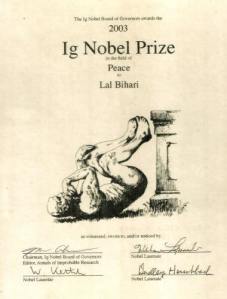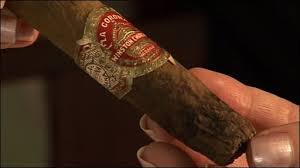Continuing from my last post ‘The Flaws In Our Laws’ By Bibek Debroy | My Scribbling Of The Session – Part I, here I proceed to jot down the next two anecdotes that were also the most interesting anecdotes of the session.
.
Identifying Surplus Government Posts
Anecdote 3 was about identifying redundant government posts to recommend their abolishment.
The story, as narrated to Dr Debroy by a retired senior civil officer goes as follows…
In 1973, an Administrative Reforms Commission was set up in Tamil Nadu to find posts in the system that appeared to be redundant. Two such posts identified were that of LBK, LBA. Nobody seemed to have a clue about what these abbreviations stood for, nor about the duties assigned to these posts.
Some facts unfurled when people who had retired from these positions and were drawing pensions were called upon to enquire about the posts.
In 1926, a Royal Commission on Agricultural Reform was set to improve the quality of agriculture in India . The Commission was set up under the Chairmanship of Lord Linlithgow, who later became the Viceroy of India and served from 1936 – 1943. It was decided by the Commission that agricultural productivity would be improved by improving the quality of Indian cattle by breeding Indian cows with foreign bulls. The system was as slow then as it is today, maybe much more slower. Nothing moved on the recommendations of the Royal Commissions.
Ten years on, in 1936 when it was announced that Lord Linlithgow would be the new Governor General, things suddenly stirred up in the system. The new Viceroy would certainly want to know what had happened to his recommendations.
In the government system, creating new positions is just as difficult as slashing jobs. So to get things moving, two job positions were created by invoking the name of Lord Linlithgow . The position LBK stood for Linlithgow’s Bull Keeper, who was assigned with the task of overseeing the import of bulls, while LBA’s (Linlithgow’s Bull Assistant’s) job was to ensure that cows were impregnated at the right time.

As we were in splits of laughter, he added that though these posts were abolished in the early 1980s. Yet there was another post that still continued past the 1980s.
This was the post of Churchill Cigar Assistant. The World War II had disrupted the supply of cigar from Havana. The Prime Minister of Britain, Mr Winston Churchill loved his cigars, and so his housekeeping staff looked at the possible alternative supply of Trichy cigars from India. Churchill Cigar Assistants were appointed to source cheroots from Trichy and supply them to Britain for consumption of Mr Winston Churchill. The post continued to remain long after the supply of cheerots from Trichy to Whitehall had stopped.
As we lapped up the anecdotes, Debroy proceeded to the next one.
The Dead People’s Association
Anecdote 4, the most interesting of all was about Mritak Sangh (Dead People’s Assosiation)
This is the story of Lal Bihari from Uttar Pradesh, who was declared dead on government’s revenue document after his relatives bribed the officials and announced him ‘Dead’ to usurp his ancestral piece of land.
He tried everything to prove himself alive – from pelting stones at Police Station in the hope of being arrested and thereby forcing the government to acknowledge his existence, to claiming a widow pension to his wife, hoping they would rectify the mistake upon seeing she was still married to him. But nothing changed. Any number of attempts made by him to prove that he was alive proved futile.
In the process he disco vered that there were around 20000 officially dead people in India. Having lived for a long period as a dead man alive, he made a resolve to help other landless individuals in their fight to prove themselves ‘Alive’ and thus he formed the Mritak Sangh[i] .
vered that there were around 20000 officially dead people in India. Having lived for a long period as a dead man alive, he made a resolve to help other landless individuals in their fight to prove themselves ‘Alive’ and thus he formed the Mritak Sangh[i] .
 vered that there were around 20000 officially dead people in India. Having lived for a long period as a dead man alive, he made a resolve to help other landless individuals in their fight to prove themselves ‘Alive’ and thus he formed the Mritak Sangh[i] .
vered that there were around 20000 officially dead people in India. Having lived for a long period as a dead man alive, he made a resolve to help other landless individuals in their fight to prove themselves ‘Alive’ and thus he formed the Mritak Sangh[i] .
In 2003 Bihari was awarded the Ig Nobel Peace Prize– a parody of the famous Nobel Peace Prize for his widespread altruistic “posthumous activities [i].
While this anecdote had people in splits of laughter, it also clearly revealed the vulnerabilities of the Indian Legal System.
Like a master storyteller Bibek Debroy proceeded on to tell us about the large number of state level statutes that existed in India, old archaic laws some dating back to the 19th century and Pre independence days that are no longer the least relevant, the Sarai Act, Hackney Carriage Act in London and some other anecdotes.
The Q & A round followed. His answers delved into specifics of the Sections & Clauses wherever needed.
By the end of the session it was obvious that the Dimensions of Legal Reform in India are numerous. It was also apparent that while a Lawyer would focus more on the redressal of injustice occurred, an Economist’s view of the legal system is more oriented towards mechanisms for prevention of flaws in future.
It was undoubtedly a very enlightening session. Dr Bibek Debroy used a common sense approach throughout to drive down the points and share his profound insights. It was an enriching experience for me and I personally felt that this lecture was completely at par with the lectures delivered by some of the world’s best B School professors, that I have had the privilege to attend.
Thanks to MoneyLife Foundation for giving us this wonderful opportunity to listen to a great speaker. It was definitely an opportunity NOT to be missed.
References

No comments:
Post a Comment